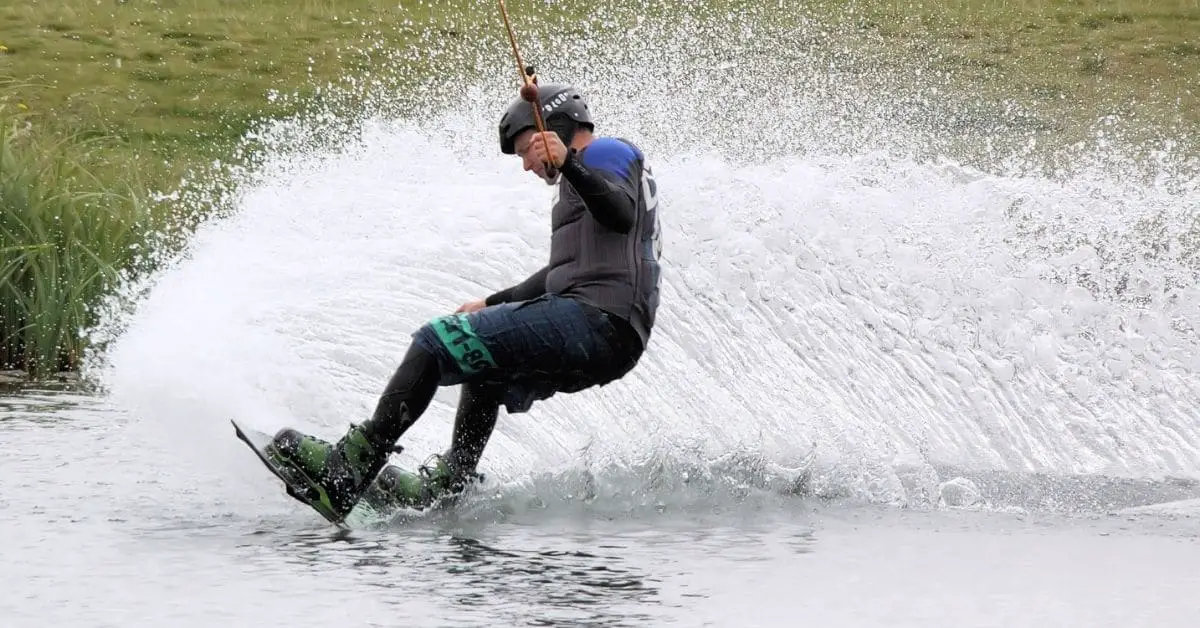One of the greatest enigmas in the wakeboarding world is whether you should wear a helmet or not. For the longest time people would argue, but there was never any real data that suggested any sort of conclusion until now.
So, I’ll get to that data later, but here’s the quick answer: Yes, Helmets do protect your head by making it less likely to get a concussion or brain damage which is most important. The argument saying that helmets cause an increase in neck injuries is true, but data shows it’s less than 1% more likely, so pretty much nothing.
Why doesn’t everyone agree about wearing helmets while wakeboarding?
I believe that every wakeboarder should wear a helmet, especially those who do a lot of tricks. Many people don’t agree with me though, and they have some solid points. Here’s their argument:
Argument against wakeboard helmets
When in water, helmets have some different effects compared to on land. Helmets float and provide a larger surface area, so when you hit the water after a fall, your head decelerates faster than if you had no helmet on. This is what a lot of the argument for no helmets is based on because this can cause neck and spine injuries from whiplash.
But as I said above, injuries from wearing a helmet such as neck muscle injuries are less than 1% more likely to happen than if you weren’t wearing one. So helmets can cause injury, but it’s very unlikely. The data I’m using for this article comes from this study from Springer Link.
Argument for wakeboarding helmets
On the other side of the story, helmets protect you from hitting your head on your board, the water, and your knee. When your ripping from one side of the wake to the other, water can begin to feel almost like concrete when you fall.
Having that extra protection by wearing a wakeboarding helmet helps keep your brain safe, which is far more important than getting a little soar neck, in my opinion. Remember, Brain damage is irreversible, it’s never worth risking it.
How much do helmets help prevent head injury?
Although there isn’t a lot of data out there, there are still a few facts we can look at when tackling this question. For example, there have been cases of wakeboarders who have sustained a hematoma after attempting a flip without wearing a helmet. This is a serious brain injury that needs medical care.
A helmet would have stopped that from happening as it softens the blow after falling hard into the water.
What kind of wakeboarder needs helmets the most?
The better you are at wakeboarding, the more you need a helmet. Especially people who are doing crazy flips at high speeds are more susceptible to injury than those who are doing tail grabs. No matter how good you think you are, you’re going to fall, and the good borders fall much worst than the bad ones.
In the study that I was explaining above, 77.6% of injuries of the wakeboarders they studied occurred from trying to do tricks with ramps, boxes, and other park obstacles. Many of which were head injuries. If you are wakeboarding through park obstacles, helmets are an absolute must.
What are the best wakeboarding helmets?
Most wakeboarding helmets are pretty similar, but I would recommend getting one that has ear protection like the one in the picture below. You can find that helmet here on Amazon.

The reason you want ear protection on a helmet is that when you fall on the side of your head, regular helmets may cause a cupping effect with the water, making injuries such as a ruptured eardrum very likely.
How can you get your kid to wear a wakeboarding helmet?
Not all kids will think helmets are cool, but many professional wakeboarders wear them. If your kids just won’t wear them, tell them that it will help give them more confidence to do harder tricks because falling won’t be as scary.
How many concussions until you should quit wakeboarding?
In an article from psychologytoday.com, they say any athlete that has 3 or more concussions has a higher chance of long-term cognitive impairment and emotional struggles. So for someone with that many concoctions, an extreme sport like wakeboarding might not be a very good idea.
Are helmets needed for other watersports like skiing?
Generally, you don’t need a helmet for skiing because you don’t usually jump or do crazy tricks on water skis. This means you won’t fall on your head very often. This doesn’t mean you shouldn’t wear a helmet while water skiing though, there’s still a danger to head injury especially if you are in shallow water or near rock piles that the skier could hit.
- What Is The Cheapest Way To Store A Boat? - February 28, 2023
- Do Boats Need Bottom Paint? (Uncovering the Truth) - February 2, 2023
- How Much Is Bass Boat Insurance? (Real Quotes) - January 18, 2023

